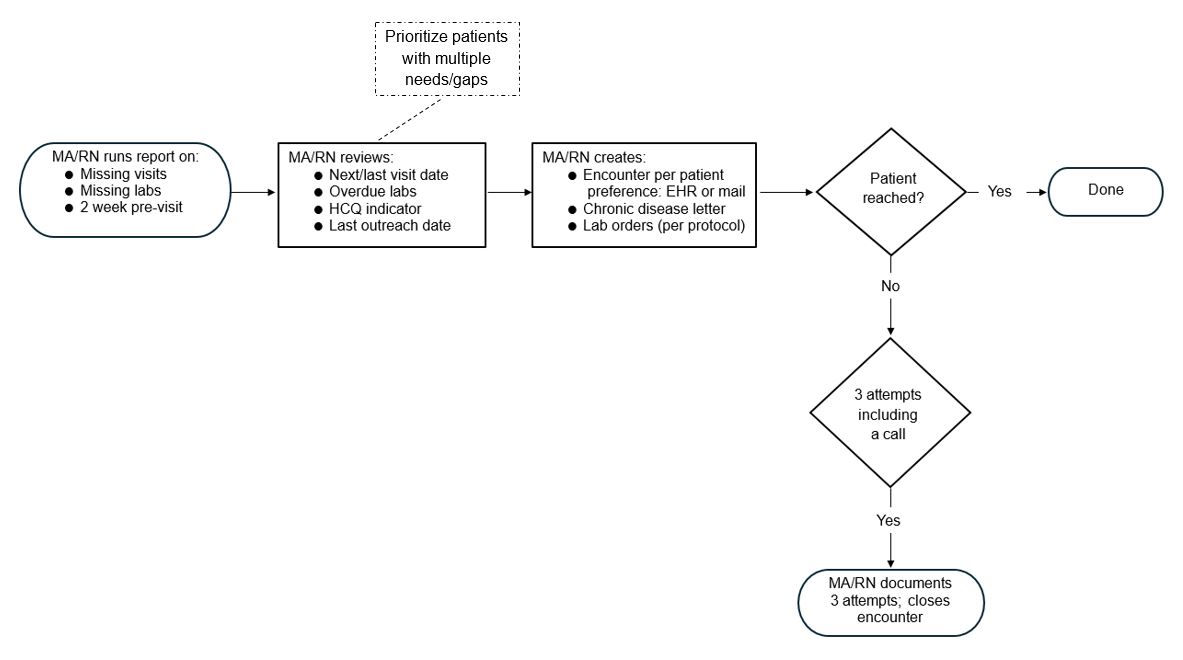Session Information
Date: Sunday, October 26, 2025
Title: (0210–0232) Measures & Measurement of Healthcare Quality Poster I
Session Type: Poster Session A
Session Time: 10:30AM-12:30PM
Background/Purpose: Lupus affects up to 1.5 million people in the US with significant health disparities in care and outcomes that call for care delivery innovation. Similar disparities in HIV were addressed using a globally-endorsed Care Continuum model with steps including measuring linkage and retention in specialty care by visits and labs. The Continuum led to evidence-based interventions that improved disease control including an effective Electronic Health Record (EHR) outreach intervention. Given prior success, we aimed to adapt a care retention intervention for SLE. Our objectives were to convene patients, clinicians, public health leaders, and community partners to adapt and design a pilot intervention to address SLE Care Continuum gaps.
Methods: We convened 8 focus groups (3 patient, 3 healthcare, and 2 external rheumatology/public health advisory group meetings) to discuss interventions for care retention in lupus. Participants included 10 patients with SLE, 7 rheumatologists, 2 RNs, 2 primary care physicians, 2 patient advocates, and 3 public health experts. Groups spanned 4 US states, 5 academic centers, 2 countries. Focus groups were a series of 60–90-minute virtual meetings. Transcripts were analyzed using NVivo software for content analysis.Based on suggestions, experts at one academic center co-designed an EHR (Epic) workbench to highlight clinic patients with SLE lacking: (a) rheum clinic visit scheduled or completed in > 6 months or (b) recent laboratory tests (CBC, creatinine, urinalysis protein, complement, dsDNA every 6 months for SLE, 3 months for lupus nephritis. We added hydroxychloroquine (HCQ) and steroid indicators per 2023 ACR SLE clinical quality measures. Inclusion required age ≥18 and at least 1 rheumatologist lupus code; patients without any rheumatology clinic visits (e.g., receiving outside care) were excluded.
Results: Advisors shared desires for patient reminders and outreach for due visits, labs and refills and consistent clinical personnel to address potential barriers (i.e., “patient navigator”). While many supported dedicated patient navigators, clinicians noted low resources and staff turnover as limitations. Based on this input, we designed an EHR staff outreach intervention with potential to scale to other clinics and staff. Three workbench views (Fig 1a-c) included those lacking: 1) visits, 2) lupus labs, or 3) lacking labs with upcoming visits within 2 weeks (to aid pre-visit planning). The workbench also displays all three 2023 ACR lupus clinical quality measures: hydroxychloroquine use, kidney lab testing, and prednisone reduction. Outreach tools consisted of modifying an existing chronic disease outreach letter to indicate a need to call for a visit or labs (Fig 2). Letters could be sent via EHR portal or mail by patient preference; subsequent contacts included calls by RN/MA outreach staff workflow (Fig 3).
Conclusion: Advisors guided adapting a proven EHR outreach intervention for care retention in SLE. Using an EHR workbench and a staff workflow with a simple chronic disease outreach letter, we created tools to address SLE care retention. The workbench also displays all three 2023 ACR lupus quality measures for use in future studies.
 Figure 1: Three Workbench views include 34 columns with selected features shown in A-C. (A) Search panel to specify visit or lab list, (B) Overdue visit and lab list (yellow) with next and last visit dates plus ER and hospital dates, and (C) Other indicators for nephritis, open orders (purple circle), kidney test, HCQ, and steroid indicators (blue box), and adverse Area Deprivation Index (ADI) neighborhood (red) plus preferred language for instance.
Figure 1: Three Workbench views include 34 columns with selected features shown in A-C. (A) Search panel to specify visit or lab list, (B) Overdue visit and lab list (yellow) with next and last visit dates plus ER and hospital dates, and (C) Other indicators for nephritis, open orders (purple circle), kidney test, HCQ, and steroid indicators (blue box), and adverse Area Deprivation Index (ADI) neighborhood (red) plus preferred language for instance.
.jpg) Figure 2: Chronic Disease Outreach Letter staff view (top) and patient view (bottom).
Figure 2: Chronic Disease Outreach Letter staff view (top) and patient view (bottom).
.jpg) Figure 3: Process flow diagram for using the Lupus Outreach Workbench
Figure 3: Process flow diagram for using the Lupus Outreach Workbench
To cite this abstract in AMA style:
Gilbert R, Blanks S, Buie J, Cronin M, Decker J, Dickmann L, Drenkard C, Ferguson S, Garg S, Gazeley D, Gilmore-Bykovskyi A, Johnson G, Katz P, Lazewski T, Lim S, McGoldrick J, Phelps K, Ramly E, Ramsey-Goldman R, Rosenthal A, Thomas-Semanko D, Stoltz S, Tellez-giron P, Weber A, Wipperfurth A, Bartels C. Creating an EHR Lupus Outreach Workbench to Address Care Gaps [abstract]. Arthritis Rheumatol. 2025; 77 (suppl 9). https://acrabstracts.org/abstract/creating-an-ehr-lupus-outreach-workbench-to-address-care-gaps/. Accessed .« Back to ACR Convergence 2025
ACR Meeting Abstracts - https://acrabstracts.org/abstract/creating-an-ehr-lupus-outreach-workbench-to-address-care-gaps/
